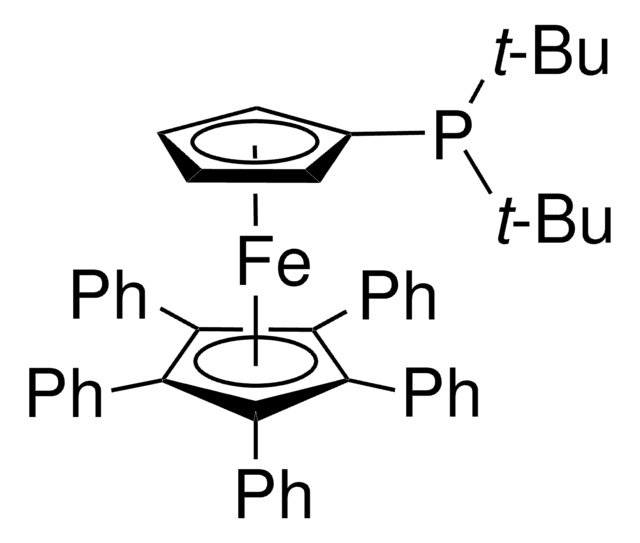672661
2-(Di-tert-butyl-phosphino)-1-phenyl-1H-pyrrole
95%
Synonym(s):
N-Phenyl-2-(di-tert-butylphosphino)pyrrole, N-Phenylpyrrol-2-yldi-tert-butylphosphine, cataCXium® PtB, phosphine ligands
About This Item
Recommended Products
Quality Level
Assay
95%
reaction suitability
reaction type: Asymmetric synthesis
reagent type: ligand
reaction type: Buchwald-Hartwig Cross Coupling Reaction
reagent type: ligand
reaction type: Dehydrogenation
reagent type: ligand
reaction type: Suzuki-Miyaura Coupling
functional group
phosphine
SMILES string
CC(C)(C)P(c1cccn1-c2ccccc2)C(C)(C)C
InChI
1S/C18H26NP/c1-17(2,3)20(18(4,5)6)16-13-10-14-19(16)15-11-8-7-9-12-15/h7-14H,1-6H3
InChI key
DVVDGSKDQGMLPW-UHFFFAOYSA-N
General description
Legal Information
Storage Class Code
11 - Combustible Solids
WGK
WGK 3
Flash Point(F)
Not applicable
Flash Point(C)
Not applicable
Personal Protective Equipment
Choose from one of the most recent versions:
Already Own This Product?
Find documentation for the products that you have recently purchased in the Document Library.
Customers Also Viewed
Articles
cataCXium® ligands facilitate cross-coupling reactions, essential in polymer science, fine chemicals, and pharmaceutical industries.
cataCXium® ligands facilitate cross-coupling reactions, essential in polymer science, fine chemicals, and pharmaceutical industries.
cataCXium® ligands facilitate cross-coupling reactions, essential in polymer science, fine chemicals, and pharmaceutical industries.
cataCXium® ligands facilitate cross-coupling reactions, essential in polymer science, fine chemicals, and pharmaceutical industries.
Our team of scientists has experience in all areas of research including Life Science, Material Science, Chemical Synthesis, Chromatography, Analytical and many others.
Contact Technical Service













